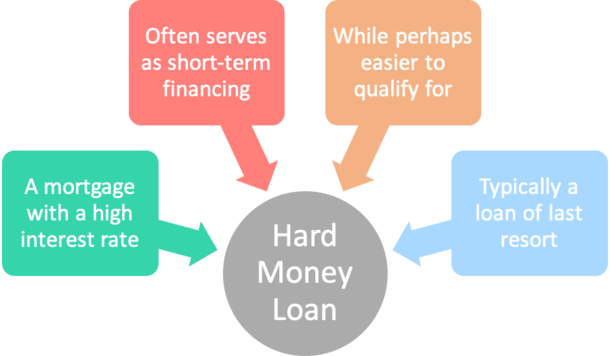The Necessary Guide to Understanding a Hard Cash Financing for Real Estate Capitalists
In the world of actual estate investment, hard money loans stand as an expedient resource, mainly used for tasks requiring rapid funding mixture, such as residential or commercial property flips or immediate improvements. As we check out the nuanced dynamics of difficult money financings, financiers stand to gain a deeper understanding of how to leverage these financial devices properly while minimizing possible challenges.
Specifying Hard Money Car Loans: What They Are and Exactly how They Differ From Conventional Funding
Tough cash finances are a details type of financing that stands in contrast to traditional borrowing approaches. Commonly sourced from exclusive capitalists or business, these fundings are secured by genuine estate assets, as opposed to the consumer's creditworthiness. This emphasis on collateral rather than credit history rating essentially separates hard cash finances from even more traditional options such as financial institution home loans, which primarily evaluate a customer's credit report and revenue.
One trick feature of hard cash financing is its speed. The approval procedure is typically much faster, often happening within days, because it counts less on exhaustive credit rating checks and more on the worth of the protected property. This suitability can be critical in competitive property markets where fast financing is important.
In addition, difficult cash fundings are usually short-term, typically lasting no more than a couple of years. This short-term nature shows the regular intent behind such financing: to sustain fast turn-around tasks like renovations or property turns.
The Advantages and Difficulties of Utilizing Difficult Money for Real Estate Investments

Nonetheless, these financings featured greater rates of interest contrasted to traditional fundings, mirroring the raised threat taken by loan providers. The shorter settlement periods can develop stress on financiers to quickly restore and flip properties. This can lead to rushed jobs or economic stress if the building does not sell as rapidly as anticipated. Therefore, while tough money financings can be powerful devices, they need strategic administration to additional reading minimize fundamental threats.
Navigating the Process: Securing and Paying Back a Difficult Cash Funding
Just how does one efficiently navigate the procedure of safeguarding and settling a tough Learn More cash financing? For genuine estate capitalists, the trip begins with an in-depth evaluation of their economic standing and the worth proposition of the residential property concerned. Protecting a hard money funding normally includes coming close to specialized loan providers that focus on asset-based lending. These lenders assess the loan-to-value (LTV) ratio, which is essential in identifying the funding amount relative to the residential property's value.

Once the lending is secured, capitalists should be vigilant in managing their task timelines and spending plan as payment usually lines up with the speedy sale or refinancing of the residential property. Hard money financings commonly come with higher rates of interest and shorter payment durations, making prompt conclusion of the property job critical. Successful repayment hinges on the financier's capacity to enhance the building's value and bankability swiftly, therefore ensuring it can be sold or re-financed at a revenue before the lending develops.

Conclusion
To conclude, difficult index money finances are a vital device for genuine estate investors requiring speedy economic options. They offer benefits such as quick funding and much less stringent credit rating demands, the difficulties, including higher rate of interest prices and shorter payment terms, demand thorough planning and management. By meticulously navigating these financings, capitalists can improve building value and make sure successful outcomes in their actual estate undertakings, even in fiercely competitive markets.

However, these finances come with higher interest rates compared to conventional financings, mirroring the raised risk taken by lenders.In final thought, tough cash loans are a vital tool for real estate financiers requiring speedy economic remedies.